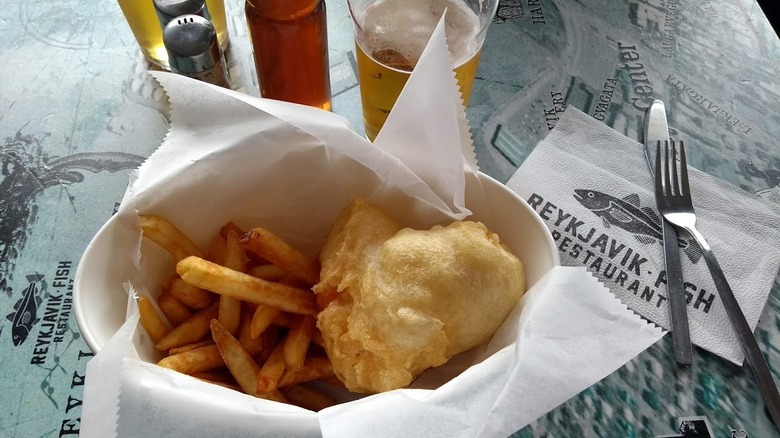Why Icelandic Fish And Chips Are Different From Those In The UK
Fish and chips is an iconic British meal that pairs crispy fried fish fillets with thick slices of fried potatoes. For the British, there's probably nothing more comforting than indulging in this deliciously greasy dish on a rainy day, especially when it's bought at one of many "chippies," where fish and chips are often served in newspaper or parchment paper. Most commonly, fillets of fish such as haddock, cod, and flounder are used to make the dish -– they're dipped in batter and fried in hot oil or lard. And for the potatoes, it's recommended to use Maris Piper or King Edward varieties when making the chips (per TasteAtlas).
Once done, the British fish and chips are traditionally accompanied by malt vinegar, but there are other sides as well, such as mushy peas, tartar sauce, brown sauce, or curry sauce. But did you know that Iceland also has its own spin on fish and chips? Female Foodie reports that there's a restaurant serving Icelandic fish and chips in Reykjavik, and the meal is somewhat different than those in the UK chippies.
Icelandic fish and chips vs. UK fish and chips
Yahoo! News revealed that the Icelandic Fish & Chips restaurant was opened in New York in 2007, but now it's permanently closed. Some people got the chance to try it out without visiting Reykjavik and found out some key differences between the Icelandic and UK versions of fish and chips. First of all, in the UK, the fish fillets are dipped in a batter consisting of flour, beer, vinegar, baking soda, and salt, while the Icelandic batter is made with spelt flour, resulting in a lighter texture once the fish has been fried to perfection. Scan Magazine reports that the fish is fried in rapeseed oil due to its "heat tolerance."
In Iceland, the potatoes are not fried but roasted and then sprinkled with parsley. And finally, the accompaniments –- Icelandic fish and chips are traditionally served with Skyronnes, a dip made by mixing herbs, spices, olive oil, and skyr, an Icelandic dairy product that's similar to yogurt, just thicker and creamier (via EatingWell). And if life ever takes you to Reykjavik, make sure to try this slightly healthier Icelandic version of a classic British meal.

